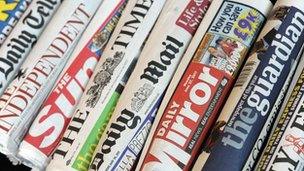Leveson: Cameron's dilemma
- Published
- comments

Regulation of the press is set to be reformed following the Leveson Inquiry.
There are three moderately interesting things that sources close to Lord Justice Leveson have told me about his report into press standards, due to be published on Thursday.
First, it will be a monster, huge, Proustian in size (if not in literary ambition).
Second, it is written in the style of a court judgement - with all the recommendations pinned explicitly to the lorry-loads of public evidence delivered to the inquiry in oral and written form.
And, by the way, the reason Sir Brian Leveson is skipping town the moment he reads out his reform proposals, and not taking any questions from the media, is precisely because he is sticking to the letter of his mandate to conduct a judicial investigation: it would be unorthodox for a judge to be interrogated by those in the dock, the media, after passing sentence.
Third, much of the press will loathe the recommendations (that of course is the surmise of my sources, based on their knowledge of what Sir Brian Leveson will say, and their expectation of how it will go down with media groups).
Or to put it another way, the judge has rejected the plea for toughened-up self-regulation desired by the owners and editors of the Mail, Telegraph and Sun.
Now, as you can see, the defining characteristic of my knowledge of the Leveson report is that I don't know very much.
But even so, there is a clear implication that the government and Labour will have to make a difficult, once-in-a-generation assessment of the way that the structure of the media industry has changed over the past few years.
Many politicians will of course say they are evaluating Leveson on the basis of whether or not it represents the slippery slope to restricting the ability of the fourth estate to hold power to account.
And, as it happens, in the days before I joined the BBC and the opinion-vocalising part of my brain was temporarily shut down, I was on record as opposing any kind of statutory regulation of newspapers, precisely because I feared an important bulwark of our freedoms might be imperiled.
Now someone might challenge pre-BBC Robert Peston by asking whether today's media moguls are champions and guarantors of our liberties or over-mighty barons - who have shown wilful neglect for the privacy and liberties of vulnerable individuals.
So for the idealists, the force or weakness of Leveson's plans will be in how he curbs the ability of the press to trample on the innocent while reinforcing its power to unseat the corrupt.
But there will also be a far more cynical calculation by the leaders of the main parties: has the press been so weakened by the rise of the internet and recession that they can stand up to it, back Leveson, and not risk being consigned to the oblivion of opposition forever?
In almost 30 years as a journalist, I have watched prime ministers and opposition leaders sucking up to newspaper owners and editors. And when I have asked these giants of politics why they act like pygmies in the presence of the Murdochs, for example, they have said to me - in terms - that they don't like doing it, but that it is necessary for what they see as the greater good of securing office.
Here is the thing: can political parties now take their message directly to the people via Twitter and Facebook (and television and radio, as ever); or can they still be made or broken by a headline in the Sun and Mail?
They won't say so, but David Cameron and Ed Mililband will be thinking pretty hard about what fighting the next election would be like, if they were perceived by the Mail, Sun and Telegraph as mortal enemies.
Now the prime minister is getting Sir Brian Leveson's report a day before the rest of us, at 1.30pm on Wednesday.
According to those close to him, it is theoretically possible that he will simply accept all of Sir Brian's proposals - although they did not say that with any great conviction.
And David Cameron won't simply reject Leveson and say that the status quo is fine.
In other words he appears to be hoping that the press - in its entirety - rapidly comes up with a much toughened-up system of self regulation that would have three central elements: fines for misbehaviour of up to £1m; very prominent apologies, and investigations of misconduct that are genuinely independent.
But if he trusts the press to sort itself out in this way there is a risk for him. What if, as is possible, disclosures in the criminal trials of News International staff relating to phone hacking and alleged bribing of officials turn out to be even more shocking than the disclosures made so far?
Those trials start next autumn and winter. The prime minister will need to be pretty confident that reinforced self-regulation agreed before then will be seen to have the deterrent force necessary to prevent repetition of whatever emerges in those court hearings.
Otherwise he risks being attacked, shortly before the next election, for having let newspapers off too lightly.